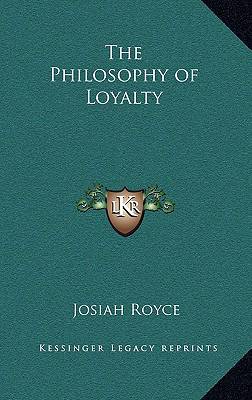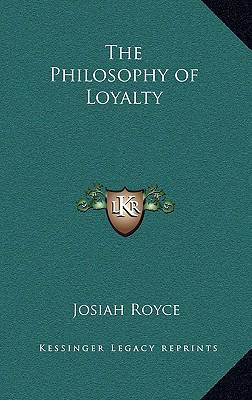
- Retrait gratuit dans votre magasin Club
- 7.000.000 titres dans notre catalogue
- Payer en toute sécurité
- Toujours un magasin près de chez vous
- Retrait gratuit dans votre magasin Club
- 7.000.0000 titres dans notre catalogue
- Payer en toute sécurité
- Toujours un magasin près de chez vous
Description
The Philosophy of Loyalty is a book written by Josiah Royce, a prominent American philosopher, in which he explores the concept of loyalty from a philosophical perspective. The book is divided into three parts, each of which delves into a different aspect of loyalty. In the first part, Royce examines the nature of loyalty and its relation to other moral concepts such as duty, love, and honor. He argues that loyalty is a unique moral virtue that involves a deep commitment to a person, group, or cause, and that it is essential for building strong relationships and communities.In the second part, Royce explores the role of loyalty in social and political life. He discusses how loyalty can be both a unifying force and a source of conflict, and how it can be used to promote social justice and political stability.In the third part, Royce considers the challenges and limitations of loyalty. He discusses the dangers of blind loyalty and the importance of critical reflection, and he explores the ethical dilemmas that can arise when loyalty conflicts with other moral obligations.Overall, The Philosophy of Loyalty is a thought-provoking and insightful exploration of a complex and important moral concept. It offers a nuanced and sophisticated analysis of loyalty that will be of interest to philosophers, social scientists, and anyone interested in the nature of human relationships and moral values.1911. Josiah Royce was born in California where he began his teaching career. From 1882 he taught philosophy at Harvard where William James was an early influence. After the latter's death, Royce became the leading American philosopher of his day, always applying his thought to concrete moral issues and drawing upon an exceptional understanding of music, literature and history. Contents: Nature and Need of Loyalty; Individualism; Loyalty to Loyalty; Conscience; Some American Problems in their Relation to Loyalty; Training for Loyalty; Loyalty, Truth, and Reality; and Loyalty and Religion. See other titles by this author available from Kessinger Publishing.This scarce antiquarian book is a facsimile reprint of the old original and may contain some imperfections such as library marks and notations. Because we believe this work is culturally important, we have made it available as part of our commitment for protecting, preserving, and promoting the world's literature in affordable, high quality, modern editions, that are true to their original work.
Spécifications
Parties prenantes
- Auteur(s) :
- Editeur:
Contenu
- Nombre de pages :
- 424
- Langue:
- Anglais
Caractéristiques
- EAN:
- 9781163211304
- Date de parution :
- 10-09-10
- Format:
- Livre relié
- Format numérique:
- Genaaid
- Dimensions :
- 152 mm x 229 mm
- Poids :
- 789 g

Les avis
Nous publions uniquement les avis qui respectent les conditions requises. Consultez nos conditions pour les avis.






